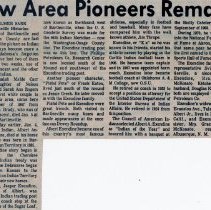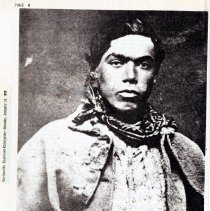Archive Record
Images


Metadata
Catalog Number |
1960.6175.01 |
Object Name |
Document |
Description |
FEW AREA PIONEERS REMAIN By ELMER SARK, Bartlesville Historian Bartlesville Examiner Enterprise January 15, 1973 Pioneers of Bartlesville and Washington County are fast fading from the picture as Indian, Territory days become more a part of Oklahoma's forgotten past. We have lost two of them in the past two weeks, one of Cherokee descent and the other a Delaware Indian. Mrs. Beualah Mable Carr Brady, daughter of Nelson Franklin and Sarah Ann Rogers Carr, the first white couple to settle in this area, came here in September of 1867 from Kansas. Mrs. Brady, who was of Cherokee descent, died Jan. 5 at her home in Bartlesville. Just one day earlier, Jan. 4, a Delaware Indian, Albert Andrew Exendine, died at his home in Tulsa. He was born in Bartlesville Indian Territory in 1885. The Exendine story began in 1867 when the Cherokee Delaware Indian treaty was signed and the Delawares began moving from Kansas to the Cherokee Nation Indian Territory to establish their new homes. About 1868, Jasper Exendine, the father of Albert, was operating an Indian trading post and a stage coach stop at the southeast side of the Sugar Loaf, now known as the Mound, west of Bartlesville, when the U. S. Geodetic Survey was made for the 96th Indian Meridian - now the Washington-Osage County line. The Exendine trading post was on this line. The Phillips Petroleum Co. Research Center is now located south of the Mound and southwest of the Exendine trading post. Another pioneer character, "Pistol Pete" or Frank Eaton, lived just south of the mound on Jessie Creek. He later moved in with the Exendine family. Pistol Pete and Exendine were great friends. Both visited in Bartlesville many times and made appearances at the once famous Dewey Roundup. Albert Exendine became one of this country's most famous athletes, especially in football and baseball. Many fans have compared him with the well-known athlete, Jim Thrope. Exendine, or "Ex" as he was known to his friends, started his athletic career by playing on the Carlile Indian football team in 1906. He became team captain and in 1907 was appointed team coach. Exendine later became football coach at Oklahoma A. & M. College, now O.S.U. He retired as coach in 1935 to accept a position as attorney for the United States Department of the Interior Bureau of Indian Affairs. He retired in 1954 from this position. The Council of American Indians selected Albert A. Exendine as "Indian of the Year" and honored him with a banquet at the Skelly Cafeteria, Tulsa, in September of 1968. During 1970, he was inducted into the National Foundation Hall of Fame at Akron, Ohio. Later that same year he was one of the first named to the Oklahoma Sports Hall of Fame. The Exendine family has one representative living in Bartlesville, a niece of Albert) Exendine, Mrs. Carmen McKosato Ketcher and her husband, Douglas Ketcher. They both are employed with Phillips Petroleum Co. Exendine's widow, Mrs. Grace Evanston Ave., Tulsa. Their son, Albert Jr., lives in Los Angeles, Calif., and Exendine's half-sister, Mrs. Grace Exendine McKosato, resides in Albuerque, N. M. |
Number of images |
2 |
